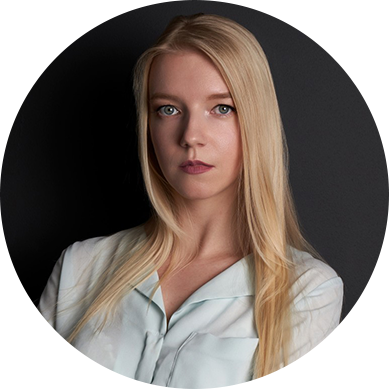Since 2012, Russians with ties to Moscow’s transgressions abroad have faced sanctions.
So far, the West’s punitive actions haven’t forced the Kremlin militarily out of Ukraine or Syria, nor have they stopped Russian President Vladimir Putin from interfering in the internal politics of Western nations.
Some question the effectiveness of sanctions, while others – like Anna Talimonchuk – want to see them toughened, arguing they are too weak.
Because she believes Western sanctions against Russian elites with close ties to the Kremlin have not gone far enough, Talimonchuk has started a grassroots organization that she hopes will help combat Russian aggression.
Launched in March 2018, Sanctions 2020 has a straightforward goal: to increase sanctions in an effort to change the Kremlin’s political calculus, particularly on its war in eastern Ukraine.
So far, the campaign is small. But it has put forth a list of 10 Russian elites it would like to see sanctioned — both oligarchs and government officials.
The names come from the “Putin list,” a document issued by the United States in 2018 that contains 210 individuals identified as having ties with Putin. However, the majority of these people face no sanctions.
If Talimonchuk has her way, that will change.
“This topic is quite painful for me,” she told the Kyiv Post. “No real progress has been made on stopping the war in Ukraine, and families, friends, and loved ones continue to die.
“The greater the publicity and attention throughout the international community…the greater the probability that Sanctions 2020’s goals will be achieved.”
Family story
Talimonchuk’s reason for launching Sanctions 2020 is personal.
In 2014, her father was wounded during the Battle of Ilovaisk, a devastating defeat in which hundreds of Ukrainian soldiers were massacred by regular Russian forces sent by Moscow to prevent Kyiv from regaining control in the eastern Donbas.

Anna Talimonchuk (Courtesy)
In August 2014, the Ukrainian military and pro-Ukrainian paramilitaries attempted to re-take the city of Ilovaisk, a strategic railroad junction, from pro-Russian insurgents. At first, they succeeded.
Then, they were surrounded by Russian military forces. Ultimately, they were forced to make an agreement with their opponents to arrange their evacuation from Ilovaisk. But the Russian forces and local insurgents did not honor the agreement. They fired on the retreating Ukrainians.
According to the Prosecutor General’s Office, 366 Ukrainian soldiers were killed in the battle.
“The Russians’ treachery at Ilovaisk is what finally made me resolved to come up with a grassroots way to counter Russian aggression,” Talimonchuk wrote in an op-ed for the Kyiv Post in May. “I wanted a movement that ordinary citizens could spearhead.”
Smart sanctions?
Sanctions against Russia have generally focused on two areas: the country’s economy and prominent individuals with connections to the government.
But sanctions against large Russian commercial enterprises or sectors of the economy can hit ordinary citizens hard, embittering them against the West and potentially increasing support for the Russian authorities.
For this reason, imposing asset freezes and travel bans on top Russian individuals represents a shift toward “smart” sanctions. The idea is that, by concentrating sanctions on important individuals, damages will be localized to those with significant influence, says Seva Gunitsky, a political scientist at the University of Toronto.
“There’s been a shift away from ‘broad’ sanctions to ‘smart sanctions’…And that’s this idea that we should focus on the specific members of the regime…and we should focus on individuals instead of hurting the people – we should go after the people at the top,” he told the Kyiv Post. “And that’s effective insofar as its harder for people like Putin to say, ‘Look, they hate Russia, they’re going after us, after the people.’”
Talimonchuk’s list of 10 is a who’s who of individuals with both official and unofficial roles in the Russian state. And for every Russian elite from the list who is sanctioned, Talimonchuk will put forward another name.
First up on the list are cellist and businessman Sergei Roldugin and Greek-Russian businessman and politician Ivan Savvidis.
In 2016, the Panama Papers leaks revealed that Roldugin, a friend of Putin, controlled a large network of offshore companies, granting him inexplicable wealth. This has led many to conclude that Roldugin is the “caretaker” of Putin’s money.
Meanwhile, Savvidis is a Kremlin proxy in Greece who worked to undermine a key agreement between Greece and Macedonia, the New York Times reported. After U.S. officials exposed Savvidis’ efforts to the Greek government, the agreement was reached. Macedonia would then change its name to “North Macedonia” in order for Athens to stop blocking its membership in NATO.
Further down Sanctions 2020’s list are billionaire God Nishanov; Russian Defense Mininster Sergei Shoigu; Russian Prosecutor General Yuriy Chayka; Sergei Ivanov Jr., the son of Putin’s former chief-of-staff; Deputy Defense Minister Valery Gerasimov, who is also chief of the general staff of Russia’s armed forces; businessman Igor Chayka, the son of Prosecutor General Chayka; billionaire property developer Zarakh Iliyev and former Deputy Prime Minister Igor Shuvalov.
But in order to get these individuals blacklisted, Sanctions 2020 has a long way to go. The organization is still young and short on financial resources.
“At the moment, we have not been receiving external support,” Talimonchuk said. “I am trying to connect with organizations to promote my campaign.”
She remains hopeful that the organization can help raise awareness about the need to sanction these individuals and, ideally, help deter Russian aggression in countries like Ukraine.
